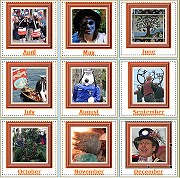
British Life & Culture
Unusual British Customs & Traditions
by Mandy Barrow
|
Calendar of unusual Customs and Traditions
in England, Scotland and Wales |
|||
|
Imbolc Fire Festival Huddersfield. Imbolc is based on a 2000 year old Celtic festival, marking the first signs of spring. It features a procession, fire 'circus' drama and music.
Starts at Marsden Station. Lantern & torch parade with fire-jugglers, antler-wearing drummers, Celtic characters, fire druids, a 12ft Jack Frost and spring's Green Man. Blessing the Throats, St Ethelreda, London Two candles are tied together, lit, and touched on to the necks of people suffering from sore throats. Hurling the Silver Ball, St Ives Cornwall The game starts at 10.30am. The silver ball is thrown from the wall of the parish church by the mayor into the waiting crowd, then passed from one to another on the beaches and through the streets of the town. The person holding the silver ball at 12.00pm takes it to the mayor at the Guildhall and receives the traditional reward of five shillings. Slaithwaite Moonraking Festival - Biennial Event ( next one 2011) Street procession and theatre, starting at 18:00. Shrove Tuesday Click here to read about Shrove Tuesday Pancake Races The most famous pancake race takes place at Olney. The Olney pancake race is world famous. Competitors have to be local housewives and they must wear an apron and a hat or scarf. Annual Pancake Grease At the famous Westminster School in London, the annual Pancake Grease is held. A verger from Westminster Abbey leads a procession of eager boys into the playground where the school cook tosses a huge pancake over a five-metre high bar. The boys then race to grab a portion of the pancake and the one who ends up with the largest piece receives a cash bonus from the Dean. The Ringing of the Pancake Bell More than a hundred years ago, Shrove Tuesday used to be a half-day holiday. A church bell, called the ‘Shriving Bell’, would have been rung signalling the start of the holiday and to call people to church to confess their sins. The church bell was rung at eleven or twelve o’clock in the morning, as a signal to housewives to start frying the traditional pancakes. The Pancake bell is still rung in some towns including Scarborough. Skipping In Scarborough, on Shrove Tuesday, everyone assembles on the promenade to skip. Long ropes are stretched across the road and there maybe be ten or more people skipping on one rope. The origins of this customs are not known but skipping was once a magical games, associated with the sowing and spouting of seeds, which may have been played on barrows (burial mounds) during the Middle Ages. Shrovetide Football, Ashbourne, Derbyshire 16 February 2010 Shrove Tuesday sees the start in Ashbourne, Derbyshire of the world’s oldest, largest, longest and maddest football game. The game is played over two days and involves thousands of players. The goals are three miles apart and there are only a few rules. The ball is a hand-painted, cork-filled ball. Pancake Race - London The Great Spitalfields Pancake Race. . Ash Wednesday 2010 (the day after Shrove Tuesday) A playground tradition was to carry a piece of twig from an ash tree in your pocket or down your sock. Anyone who didn't have an ash twig had his or her feet trodden on. Kissing Friday (the Friday after Ash Wednesday) Friday of Shrove Week, English schoolboys were once entitled to kiss girls without fear of punishment or rejection, a custom that lasted until at least the 1940s. In Sileby, Leicestershire, this day was also known as Nippy Hug Day. There men could demand a kiss from the woman of their choice, but if their petition was denied, they had the right to louse, or pinch, the woman's posterior-- perhaps mimicking the pinching of lice.
|
|||
|
© Copyright Mandy Barrow 2013
Mandy is the creator of the Woodlands Resources section of the Woodlands Junior website.
The two websites projectbritain.com and primaryhomeworkhelp.co.uk are the new homes for the Woodlands Resources.
Mandy left Woodlands in 2003 to work in Kent schools as an ICT Consulatant.
She now teaches computers at The Granville School and St. John's Primary School in Sevenoaks Kent.







 ©
© 
